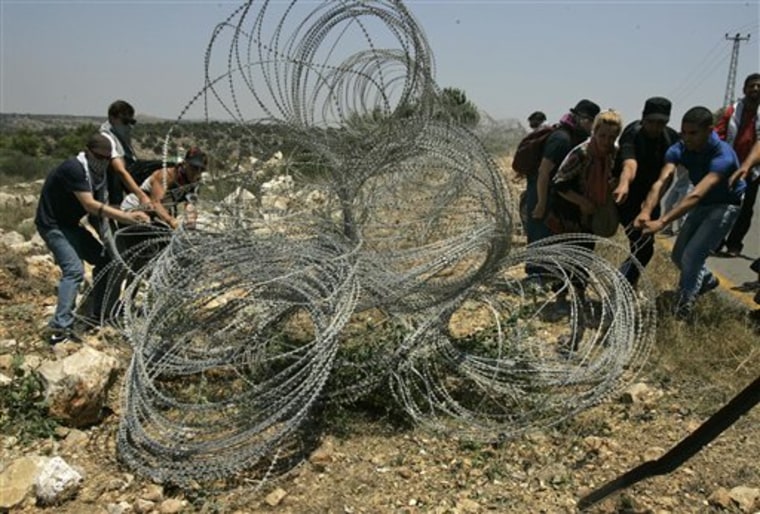A new law that seeks to impede boycotts against Jewish settlements in the West Bank sparked a ferocious debate Tuesday between supporters who praised it as a bulwark against efforts to isolate Israel and critics who warned it threatens the nation's democracy.
Human rights groups said they would ask the Supreme Court within days to overturn the law, which allows settlers or settlement-based businesses to sue Israelis who promote settlement boycotts. Courts would determine whether a boycott caused financial harm and, if so, assess damages.
The law passed late Monday despite a warning from parliament's legal adviser Eyal Inon that it violated freedom of expression and could be illegal.
The dispute reflects a growing chasm separating Israelis who support the country's 44-year-old occupation of the war-won West Bank and others who view the presence of soldiers and settlers in the territory — claimed by Palestinians for their hoped-for state — as a national calamity.
Prime Minister Benjamin Netanyahu himself, along with key members of his Cabinet, didn't turn up for Monday's vote, suggesting there might be a measure of discomfort with the proposed legislation.
Some foreign backers of Israel were clearly uncomfortable.
The New York-based Anti-Defamation League, a Jewish group that fights anti-Semitism, expressed rare criticism of Israel.
"To legally stifle calls to action — however abhorrent and detrimental they might be — is a disservice to Israeli society," wrote ADL director Abraham Foxman in a statement.
He later told The Associated Press that the Israeli Supreme Court should strike down the law. "I hope they do it sooner rather than later," he said.
Supporters denied the new law violated freedom of expression and the right to protest.
The bill's sponsor, Zeev Elkin of Netanyahu's ruling Likud Party, told Army Radio that the law "is not meant to muzzle anyone, but to protect the citizens of Israel" who are settlers. Co-sponsor Danny Danon called it a way to punish "those who would support our enemies abroad."
Critics, however, predicted the law would provide a tail wind to a worldwide activist campaign to boycott Israel over its conduct toward the Palestinians — an effort many in Israel regard as masking a deeper challenge to the country's very right to exist.
It will "serve as a weapon in the hands of those people who claim that Israel is not a democracy and does not respect human rights," said law professor Amnon Rubinstein, a former leading Cabinet minister.
"Yesterday will be remembered for years to come as the blackest day in parliament's history," Rubinstein wrote in the Maariv newspaper.
At the heart of the issue is the question of Jewish settlements in the West Bank. Some 300,000 Israelis now live in those communities, along with 200,000 more who live in the occupied, Israeli-annexed sector of Jerusalem.
Nationalist Israelis view the settlers as asserting Jewish historical rights to the territory. Critics fear their presence makes a withdrawal more difficult and is turning Israel into an effectively binational state in which Palestinians will eventually outnumber Jews.
In a related development, Israel's parliament is set to consider a proposal next week to investigate foreign funding of local dovish groups that call for action against Israel.
"What we are talking about is investigation committees into organizations that use foreign money to delegitimize Israel," Faina Kirshenbaum of the nationalist Yisrael Beitenu party, which initiated the proposal, told Israel TV.
Last week, a noted professor and filmmaker, Yehuda Neeman, caused an uproar by telling an interviewer that the dispute between left and right in Israel should be resolved by a "civil war." He later explained he was trying to provoke debate.
Liberals also see the new law as part of a bigger trend — a siege mentality that seems to grow deeper with each diplomatic blow that Israel absorbs over its treatment of the Palestinians.
These have included a U.N. report accusing Israel of committing war crimes during a military offensive in the Gaza Strip in 2009, and a global uproar over a deadly naval raid last year on a flotilla of pro-Palestinian activists seeking to break a sea blockade of Gaza.
In the past two years, since Netanyahu was elected, nationalists have put forward a succession of bills that they say are necessary to preserve Israel's Jewish identity and to fend off various challenges.
Among the new laws:
— New citizens are now required to pledge a loyalty oath to a "Jewish and democratic state" — a measure that critics have called racist because it is not required of Jews being naturalized.
— State funding will be denied to any municipality that commemorates Israel's 1948 creation as the "nakba," or "catastrophe," because of the uprooting of hundreds of thousands of Palestinians. The measure is seen as targeting the 20 percent of Israel's citizens who are Arabs.
— Small communities now have the authority to reject admission to applicants that are perceived as not fitting into their social fabric — another measure seen as targeting Arabs.
Nationalists are also trying to take action against groups that provide information that could be used to support war crimes allegations against Israel in court cases raised in other countries.
___
Associated Press writer Ian Deitch in Jerusalem contributed to this report.
